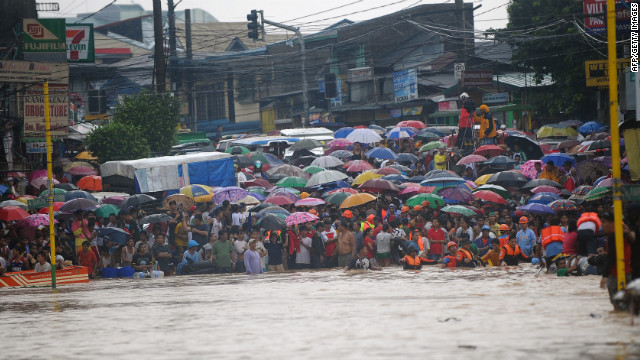In the national and international security environment, climate change threatens to add new hostile and stressing factors. On the simplest level, it has the potential to create sustained natural and humanitarian disasters on a scale far beyond those we see today. The consequences will likely foster political instability where societal demands exceed the capacity of governments to cope.
Climate change acts as a threat multiplier for instability in some of the most volatile regions of the world. Projected climate change will seriously exacerbate already marginal living standards in many Asian, African, and Middle Eastern nations, causing widespread political instability and the likelihood of failed states.
Unlike most conventional security threats that involve a single entity acting in specific ways and points in time, climate change has the potential to result in multiple chronic conditions, occurring globally within the same time frame. Economic and environmental conditions in already fragile areas will further erode as food production declines, diseases increase, clean water becomes increasingly scarce, and large populations move in search of resources. Weakened and failing governments, with an already thin margin for survival, foster the conditions for internal conflicts, extremism, and movement toward increased authoritarianism and radical ideologies.
The U.S. may be drawn more frequently into these situations, either alone or with allies, to help provide stability before conditions worsen and are exploited by extremists. The U.S. may also be called upon to undertake stability and reconstruction efforts once a conflict has begun, to avert further disaster and reconstitute a stable environment.
New research has recently come out, and it ain't pretty. This year looks to be the hottest year on record. Though not nearly as devastating as Katrina, superstorm Sandy -- a visceral example that climate change is has arrived -- is estimate to cost between $30 and $50 billion. And a new report provides an ominous glimpse into the future. "The amount of heat-trapping pollution the world spewed rose again last year by 3 percent. So scientists say it's now unlikely that global warming can be limited to a couple of degrees, which is an international goal." In all, the world dumped 38.2 billion tons of carbon dioxide into the atmosphere. That equated to almost a billion more tons than the previous year. Predictably, China was the largest polluter, dumping heat-trapping gas into the atmosphere at an increasing and alarming rate. (For its part, the United States actually reduced the amount of CO2 it emitted!) Another report was more critical of China's role in increased climate change, and suggested that dramatic steps need to be taken:
Emissions of the most significant greenhouse gas from burning fossil fuels are projected to have risen by 2.6 per cent on last year's levels to a high of 35.6 billion tonnes, analysis from the Global Carbon Project shows. It is estimated some 80 per cent of the rise is due to the economic growth of China. . . . The study, by the Tyndall Centre for Climate Change Research at the University of East Anglia, warned that if levels of carbon dioxide levels continue to go up at this rate then global warming is on track to rise to 4 or even 6C by the end of the century. . . . Professor Corinne Le Quere, a lead author of the study, said that the new figures show countries will have to cut carbon more sharply to keep temperature rise within the ‘safe’ limit of 2C.A new set of negotiations are underway in Doha, Qatar to try to deal with this ever-growing threat. A new treaty, optimists hope, will replace the failed Kyoto Protocol agreement that was supposed to cap greenhouse emissions at 5 percent of 1990 levels. Experts now estimate worldwide carbon emissions are at 54 percent of 1990 levels. Although some view this latest negotiation as a "golden opportunity" to seriously address climate change, "many delegates remain concerned that divisions between developing and wealthy nations will hamper progress." Some were critical of the decision to have the conference "in a country with some of the highest per capital emissions of carbon dioxide on earth." But the larger concern was "that the meeting could end in stalemate as old divisions between rich and poor resurface."
Although China has recently ventured into sustainable development, it must commit to substantial carbon reductions if we are to prevent the worst effects of climate change. Asia is home to some 4 billion people and occupies a region of the world that could be severely impacted by a changing climate -- flood refugees in the Indian sub-continent, water shortages in nuclear-armed Pakistan, and internally displaced farmers that will further add to stresses caused by urbanization. China, therefore, stands to gain tremendously if we can address the most dire consequences of climate change.
Fortunately, at least China is talking about addressing the issue:
But things are changing fast. In China’s new Energy Policy 2012, released in late October, the State Council announced that China wants to cut CO2 emissions per unit of GDP by up to 45% by 2020 (compared to 2005 levels). The Chinese Government promises strong support for hydro-electricity, biomass, wind and solar energy generation. And – doubtless spotting a massive export opportunity for Chinese technology - China has signalled the resumption of its domestic nuclear power generation programme as part of a commitment to reach 15% non-fossil fuel electricity generation by 2020.Given the extreme weather we've already seen in 2012, let's hope they've gained a sense of urgency.


No comments:
Post a Comment